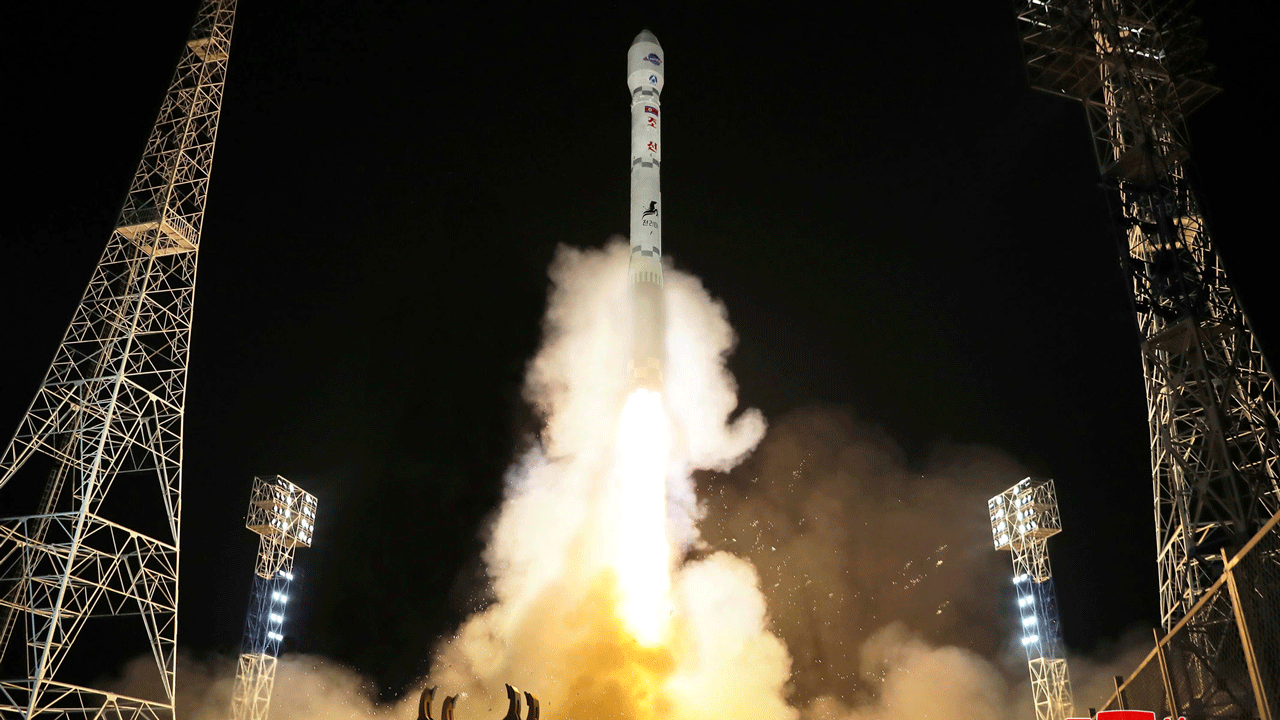South Korea says Russian support likely enabled North Korea to successfully launch a spy satellite

SEOUL, South Korea (AP) — South Korea has concluded that Russian support likely enabled North Korea to put a spy satellite into orbit for the first time this week, and it should be clear in several days whether it is functioning properly, officials said Thursday.
The launch has deepened regional animosities, with both Koreas threatening to breach a past reconciliation deal and take hostile actions along their heavily armed border.
After two launch failures earlier this year, North Korea said it successfully placed its “Malligyong-1” satellite into orbit on Tuesday night. South Korea’s military has confirmed that the satellite entered orbit, but said it needs several more days to verify whether it is working properly.
In a closed-door briefing, South Korea’s spy agency told lawmakers on Thursday that Russian assistance was likely the main reason the launch was successful, according to lawmakers who attended the meeting.

South Korea charges that Russia is assisting North Korea with its spy satellites.
The National Intelligence Service cited Russian President Vladimir Putin‘s earlier mention of a promise to support North Korea’s satellite program. It said it also obtained intelligence that North Korea had sent Russia the design and other data for its new “Chollima-1” rocket used in the two previous failed launches. The intelligence showed that Russia returned its analysis of the North Korean data, according to lawmaker Yoo Sang-bum, who attended the NIS briefing.
South Korean Defense Minister Shin Wonsik told a separate parliamentary committee meeting Thursday that Russia appears to have been providing technological assistance for North Korea’s satellite program.
The same satellite and rocket were used in all three launches. The two earlier attempts in May and August failed due to technical problems with the rocket.
There has been speculation that Russia is providing technological support for North Korea’s satellite and other programs since leader Kim Jong Un traveled to Russia to meet Putin and visit key technology and military sites in September. The Kim-Putin summit was held at Russia’s main space launch center.
Asked whether Russia would help North Korea build and launch satellites, Putin told Russian state media at the time that “that’s why we have come here.” “The (North Korean) leader shows keen interest in rocket technology. They’re trying to develop space, too,” Putin said.
The U.S., South Korea and Japan accuse North Korea of seeking to obtain high-tech Russian military technologies in return for supplying conventional arms for Russia’s war in Ukraine. Both Russia and North Korea have denied the alleged deal.
North Korea said its Malligyong-1 satellite will begin its official mission on Dec. 1. But it said the satellite has already transmitted images of military facilities in the U.S. territory of Guam and that Kim saw them. North Korea hasn’t released the images.
Many foreign experts are skeptical about the satellite’s ability to take high-resolution images and whether it is militarily meaningful. After recovering debris from the first failed launch attempt, South Korea’s military said the satellite wasn’t sophisticated enough to perform military reconnaissance.
Defense Minister Shin said he worries that Russia could help North Korea produce higher-resolution satellite photos.
Shin said South Korean, U.S. and Japanese authorities will be able to determine whether the satellite is functioning normally as early as this weekend or early next week.
South Korea, the U.S. and Japan strongly condemned the satellite launch, saying North Korea is using it to improve its missile technology as well as acquire a space-based surveillance system.
U.N. Security Council resolutions ban any satellite launches by North Korea, viewing them as disguised tests of long-range missile technology. North Korea says it has a sovereign right to launch spy satellites to cope with what it calls U.S.-led military threats. It says spy satellites would allow it to better monitor its rivals’ moves and enhance the precision-strike capability of its nuclear-capable missiles.
In response to the satellite launch, South Korea said it has partially suspended a 2018 agreement to reduce tensions with North Korea and will resume flying surveillance aircraft and drones along their border.
North Korea’s Defense Ministry slammed the South Korean decision on Thursday, saying it will deploy more powerful weapons at the border in a tit-for-tat measure. It said it won’t be bound by the 2018 deal any longer and will reverse all the steps it has taken to ease front-line military tensions under it.
South Korea’s military replied that it would “strongly punish” North Korea if it acts provocatively.
CLICK HERE TO GET THE FOX NEWS APP
South Korea’s Joint Chiefs of Staff said North Korea fired a ballistic missile toward the sea on Wednesday, but the launch likely failed. It was North Korea’s first known weapons launch in more than two months.
Kim has publicly vowed to acquire spy satellites and other high-tech weapons systems. Since last year, North Korea has test-fired about 100 ballistic missiles in an effort to expand its nuclear arsenal. Experts say Kim ultimately wants to use his enlarged arsenal to wrest greater concessions from the United States if they resume diplomacy.
Denial of responsibility! Today Breeze.in is an automatic aggregator around the global media. All the content are available free on Internet. We have just arranged it in one platform for educational purpose only. In each content, the hyperlink to the primary source is specified. All trademarks belong to their rightful owners, all materials to their authors. If you are the owner of the content and do not want us to publish your materials on our website, please contact us by email – admin@todaybreeze.com. The content will be deleted within 24 hours.



